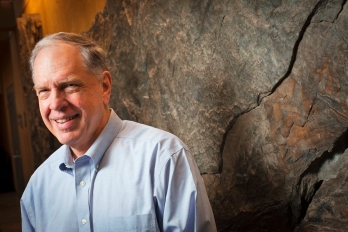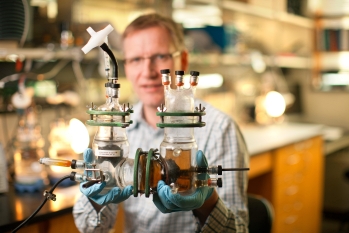COVER STORY
Q&A: Reports from the front line of ideas for a sustainable planet
What's the single biggest obstacle between us and a sustainable energy future?

Jeff Tester '66, M.S. '67, thinks that geothermal energy has the potential become a major source of U.S. electrical power. See larger image
Eventually, we need to transition completely from relying on finite fossil fuels to using renewable resources. This transition requires that we develop and deploy renewable resources at an enormous scale, but also we need to be much more efficient in the ways we use energy. Cornell is unique in organizing efforts in a larger sustainability context, focusing on connectivity in three general areas – energy, environment and economic development – because we can't solve the energy challenge without looking at the big picture. We have enormous capacity within our 11 endowed and land-grant colleges and the strong commitment of our students, faculty and staff – from the newest freshman to our president. Combining this vision with the passion of Cornell's alumni, as evidenced by the enormous generosity of David Atkinson and David Croll, is what attracted me to come back home to Ithaca. Returning to Cornell to be part of this exciting opportunity has energized me beyond what I once thought possible.
– Jeff Tester '66, Croll Professor of Sustainable Energy Systems, and associate director for energy, Atkinson Center
Cornell researchers are developing viable renewable energy sources. What looks most promising to you?

Lars Angenent, inventor of a novel anaerobic bioreactor, is developing a way to produce fuel from cow manure. See larger image
I am interested in converting organic waste materials into energy. This kills two birds with one stone, since we both need to treat wastes and generate renewable energy. In New York, we are especially poised to use organic wastes because we have two large sources – dairy manure and urban wood waste. My lab uses microbes to generate methane in anaerobic digesters and carboxylates and alcohols in fermenters. I believe strongly that our society should choose these alternative methods of generating energy before we further explore nonrenewable energy sources, such as natural gas. If we do explore natural gas, we should use the economic returns to develop a renewable energy sector in the state. In my lab, we have made breakthroughs studying the production of bio-based chemicals as a way to make conversion technologies more cost competitive with traditional energy sources.
– Lars Angenent, associate professor, biological and environmental engineering
<<View entire story as one page>>